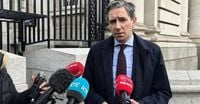In a recent late-night call, Simon Harris, Ireland’s Tánaiste and Minister for Foreign Affairs and Trade, discussed the country’s economic surplus with Howard Lutnick, the US Secretary of Commerce, who controversially claimed that Ireland has a €60 billion trade surplus with the United States. This assertion has raised eyebrows, especially as the latest figures from the Central Statistics Office (CSO) indicate that while Ireland had a goods trade surplus of €70 billion last year, it faced a staggering €163 billion deficit in services, culminating in an overall deficit of €93 billion.
The call, which took place on March 24, 2025, was described by a government spokesman as a “useful opportunity to exchange views” on trade policy and the transatlantic economic relationship. However, when asked whether Harris corrected Lutnick's misleading surplus claim, the spokesman maintained that Harris laid out Ireland's perspective and the details of its economic relationship with the US, without confirming if specific figures were discussed.
Harris's interaction with Lutnick comes at a time of heightened tension regarding trade relations between the US and the EU, particularly concerning tariffs. Finance Minister Paschal Donohoe has warned that an escalating tariff dispute could jeopardize up to 80,000 Irish jobs. The urgency of the situation is underscored by Lutnick's previous comments on the All-In Podcast, where he referred to Ireland as his “favorite tax scam,” criticizing the country’s low corporation tax rate of 12.5% that attracts many US tech and pharmaceutical companies.
During the call, Harris emphasized the importance of maintaining a strong economic relationship between Ireland and the US, noting that it was an opportunity to develop rapport with Lutnick, who will play a key role in shaping US commerce policy under President Donald Trump. He stated, “It provided us with an opportunity to exchange views in relation to trade, in relation to tariffs, in relation to the transatlantic relationship and the economic relationship between Ireland and the United States.”
Despite the constructive nature of the call, Harris's previous interactions with US officials have not been without controversy. Earlier this month, he had to clarify discrepancies between his account and an official US readout following a conversation with Marco Rubio, the US Secretary of State, regarding trade imbalances. Harris asserted that trade imbalances were “not specifically referenced” in that call, a claim that contradicted the US account, which suggested that such issues were discussed.
The fallout from these diplomatic exchanges is significant, particularly as Taoiseach Micheál Martin is set to meet President Trump soon, aiming to strengthen ties ahead of potential tariff implementations. The US Department of Commerce has yet to release a statement on the recent call, which reportedly lasted around 20 minutes.
As the trade dispute intensifies, the EU has delayed its countermeasures against the US, which were originally scheduled to target goods worth €26 billion in two phases on April 1 and April 13, 2025. The EU’s decision to postpone these measures is seen as a strategic move to allow for negotiations, with hopes that a resolution can be reached before tariffs are imposed. Harris has expressed the need for calm discussions, stating, “Tariffs are bad for consumers, and the US-EU relationship economically is so interdependent.”
However, he also acknowledged the likelihood of further tariffs being introduced by the Trump administration, which he described as “regrettable.” Harris emphasized, “We’d much rather have talks before tariffs; it seems the United States wants to have tariffs before talks.” This perspective reflects a broader concern within the Irish government regarding the potential economic impact of US protectionist policies.
The Irish government is particularly wary of the implications that tariffs on alcoholic beverages could have on its economy, especially considering the significance of the drinks sector. Harris convened a meeting of the Government’s Trade Forum on March 21, 2025, to address these issues and strategize on how to mitigate potential negative impacts from the ongoing trade tensions.
As the situation unfolds, it remains to be seen how Ireland will navigate its complex relationship with the US amidst these challenges. The government is keen to advocate for engagement and open dialogue, hoping to foster a more collaborative economic environment.






